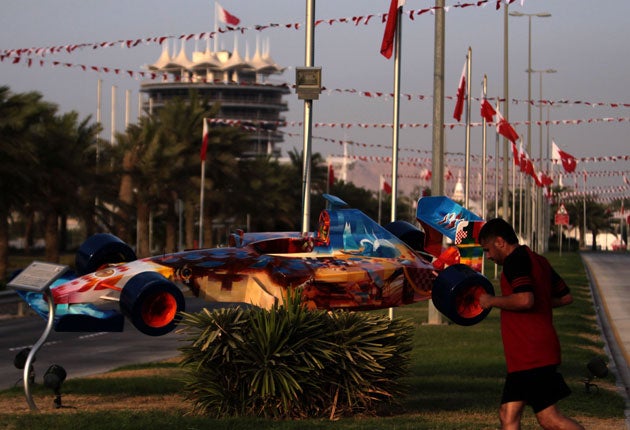Bahrain lobbies to retain Grand Prix as Formula One staff are held and abused

Your support helps us to tell the story
From reproductive rights to climate change to Big Tech, The Independent is on the ground when the story is developing. Whether it's investigating the financials of Elon Musk's pro-Trump PAC or producing our latest documentary, 'The A Word', which shines a light on the American women fighting for reproductive rights, we know how important it is to parse out the facts from the messaging.
At such a critical moment in US history, we need reporters on the ground. Your donation allows us to keep sending journalists to speak to both sides of the story.
The Independent is trusted by Americans across the entire political spectrum. And unlike many other quality news outlets, we choose not to lock Americans out of our reporting and analysis with paywalls. We believe quality journalism should be available to everyone, paid for by those who can afford it.
Your support makes all the difference.Formula One is expected to rule today on Bahrain's attempt to stage a coveted Grand Prix this season despite police arresting and abusing one quarter of the local staff during a crackdown against pro-democracy protests.
Civil unrest meant that the race was postponed in February and Formula One organisers will meet in Barcelona to decide on the rescheduling of the event after a determined lobbying effort by the government to show that life is returning to normal in the island kingdom.
In the run up to the decision on Formula One, police patrols have sought to prevent any demonstrations and controversial trials of pro-democracy protesters have been postponed. Ayat al-Gormezi, the 20-year-old girl poet, who was to be tried by a military tribunal on a charge of stirring up hatred and insulting the King, has had her trial put off until 6 June.
Of the 108 local staff of the government-owned Bahrain International Circuit (BIC), which hosts Formula One, some 28 were detained and mistreated according to a source in Bahrain close to the event. All of those arrested are Shia and have since been sacked. Five of these are still in prison including the chief financial officer Jaafar Almansoor, an employee of BIC told Reuters news agency.
"They made us beat and kick each other," said the employee, who did not want to be named, describing their 20 days in detention. "They said they'd rape us. They tried to touch you in various places to make you think it's going to happen." The prisoners were insulted for being Shia and, on being released, were told not to talk to the media.
Details of mistreatment of women in custody are often difficult to obtain because victims of abuse are ashamed to admit they were threatened with rape or otherwise humiliated.
One of the most graphic, which also illustrates the Bahraini authorities' wish to intimidate journalists, comes from Nazeeha Saeed, the Bahraini correspondent of France 24 television and Radio Monte Carlo in testimony given to Reporters Without Borders.
Summoned to a police station on 22 May, Ms Saeed was accused by a female officer of "lying" in her reports and having links to the Lebanese Shia Hezbollah television station al-Manar and the Iranian Arabic station Al-Alam. She was grabbed by the jaw, slapped, punched and kicked by four police women, one of whom screamed: "You must tell the truth." Another took off her shoe and forced it into Ms Saeed's mouth saying: "You are worth less than this shoe."
She was then dragged to another office and forced to kneel on a chair, facing the back of the chair, exposing her back and the soles of her feet which were beaten with flexible black plastic tubing. She was accused of lying and "harming Bahrain's image".
During a later interrogation session Ms Saeed was blindfolded and told to bray like a donkey and walk like an animal. She was beaten again. At this point one police woman held a plastic bottle against her mouth and shouted: "Drink, it's urine."
Ms Saeed knocked the bottle aside and it fell to the floor but the police woman picked it up and poured what was left in the bottle on her face. She says she is not certain the liquid was urine but it stung her skin.
After a further round of beating, she was sent back to wait in a room with other women. They were allowed to go to the toilet and brought food. Later the head of the police station asked to see Ms Saeed and, claiming not to know that she had been interrogated, allowed her to phone her mother and go home.
Nobody, however prominent in business or otherwise appears safe from arbitrary arrest. Ghazi Farhan, an executive in a property company who also owns three restaurants and a riding stable, was arrested in his office carpark on 12 April by plain clothes police and since then has only had two brief telephone conversations with his family.
His wife, Ala'a Shehabi, has been prevented from leaving Bahrain despite repeated representations by the Foreign Office.
Join our commenting forum
Join thought-provoking conversations, follow other Independent readers and see their replies
Comments